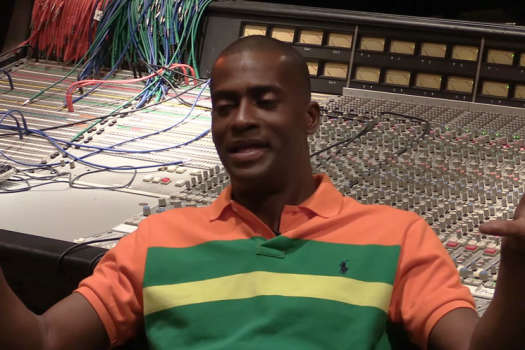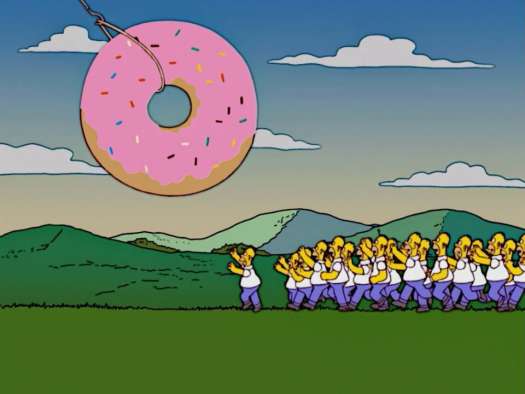"We wanted to wait til after the U.S. election. If there would still be a Republican government in [the White House] we wouldnt wanna release the album in the U.S. and thats where our labels at so... writes Love Is All guitarist Nicholaus Sparding in an email. Spardings answer to why it took the band ten months to release A Hundred Things Keep Me Up At Night, their long-awaited second album, is bold. Its also complete hogwash. Asked over the phone the next day about the validity of the bands intentions, Sparding gives a polite laugh in his gentle Swedish tone. "We wanted to release it in February this year, but it was delayed all the time for a number of reasons, but the election helped [laughs].
Love Is All will be the first to tell you how atypical they are. The U.S. election had little to do with getting A Hundred Things Keep Me Up At Night into our hands much sooner. But losing one of their labels, EMI subsidiary Parlophone, had quite a bit to do with it. And unlike most bands that would question why they were dropped, Sparding wonders why they were even signed in the first place. "I don't know what they were thinking. We would never sell as many records as they would need us to. They wanted us to work with a few different engineers for the new album, and we didn't like the sound of it. We didn't know what to do, being an indie band on a major label, so we were really self-critical. I actually dont know what theyre gonna do with the [new] album right now its only being released in North America [via Whats Yr Rupture?]. Hopefully theyll let us license the album to another label in Europe.
Having risen out of Gothenburg from the ashes of the late indie band Girlfriendo, the enthusiastic response to Whats Yr Rupture?s low-key release of their debut LP, Nine Times That Same Song, completely shattered expectations and thrust them into the indie spotlight in 2006. The five-piece, which includes singer Josephine Olausson, drummer Markus Görsch, saxophonist Ake Stromer and bassist Johan Lindwall, were as surprised as anybody when rave reviews began pouring in, considering they were virtual unknowns with no hype behind them. Says Sparding, the band are "still laughing about it, overwhelmingly! Wed never really thought about being successful, so when everything happened we were totally surprised. Part of that surprise stems from the fact that they came from nowhere even within the hot Swedish scene. Athough they formed and developed in a city that boasts Jens Lekman, the Knife, José González, Air France and the Tough Alliance, among others, Love Is All never clicked in Sweden. The disconnect was so evident, Nine Times That Same Song was never even released at home. "Weve hardly played [in Sweden] the last couple of years and the album wasnt properly released here, says Sparding. "We might be too rough and spontaneous for Sweden though. [It is odd] but I don't think we fit in with the kind of music we have in Sweden. Thats sad in a way, but you know we get to see all the happy people elsewhere.
Few bands leave their home to begin finding an audience, but when an offer from their friend Kevin Pedersen, owner of the NYC-based Whats Yr Rupture?, offered to release their music, they set sail to the U.S. and went to work. "We had released a couple of seven-inches before, and then Kevin asked us if we wanted to put out an album using all of those EPs and singles, which we wanted to do, says Sparding. "I think North America, the attitude is much more relaxed. Weve never had a label in Sweden, its very small, and we play to a few hundred people wherever we go in America. And we have more fun there.
Thanks to the big waves the band have made internationally, theyve found that on the outside they may be Scandinavian, but inside and creatively, they're more in touch with how this side of the Atlantic functions. "With both Love Is All and Girlfriendo, we've toured in the U.S. and met so many different bands that have been so influential on us. I think thats a very important part of making music: hanging out with other bands and see them playing their music. It helps you get inspired. And that sense of community is very different in Sweden. It's not a very friendly scene over here. Thats my general feeling. That Love Is All dont fit into their countrys landscape should come as no surprise. Their tattered and spiky lo-fi pop is more in the same vein as artists like LiLiPUT, Comet Gain and the Raincoats. Despite rounding the jagged edges of their debuts more post-punk tendencies, A Hundred Things Keep Me Up At Night still concentrates on capturing humble production quality and bursts of unbridled enthusiasm, which, according to the band, doesnt exactly comply with Swedens overwhelming penchant for high-gloss and composed pop music. "They like things really clean over here, he explains. "We have a dozen or so hardcore fans [laughs], but a lot of people are really annoyed by us for not being professional.
Its the bands lack of professionalism that keeps them Love Is All, however. As far as progressing and trying to expand their sound, Sparding says it just doesnt work for them to try and move beyond what they know, which is usually the game plan for any second album if you ask any other band. "If we're trying too hard its always gonna sound weird, he admits. "Weve tried different things on a couple songs, but we always trash those ones. I think were that kind of band because we talk too much, so whenever we do anything spontaneously, I think that's where all of the good songs come from.
The same attitude, it appears, applies to recording. "I suppose it always depends on what band youre in, but for Love Is All its always better to use take number one or two rather than take number ten, because sometimes the energy can disappear, Sparding says. "Thats not laziness, really, but I think we all generally get bored when we record, in a good way. It can really change the situation. Thats what weve learned having played together for so many years. And I guess that's a good thing to think about when you record.
Love Is All will be the first to tell you how atypical they are. The U.S. election had little to do with getting A Hundred Things Keep Me Up At Night into our hands much sooner. But losing one of their labels, EMI subsidiary Parlophone, had quite a bit to do with it. And unlike most bands that would question why they were dropped, Sparding wonders why they were even signed in the first place. "I don't know what they were thinking. We would never sell as many records as they would need us to. They wanted us to work with a few different engineers for the new album, and we didn't like the sound of it. We didn't know what to do, being an indie band on a major label, so we were really self-critical. I actually dont know what theyre gonna do with the [new] album right now its only being released in North America [via Whats Yr Rupture?]. Hopefully theyll let us license the album to another label in Europe.
Having risen out of Gothenburg from the ashes of the late indie band Girlfriendo, the enthusiastic response to Whats Yr Rupture?s low-key release of their debut LP, Nine Times That Same Song, completely shattered expectations and thrust them into the indie spotlight in 2006. The five-piece, which includes singer Josephine Olausson, drummer Markus Görsch, saxophonist Ake Stromer and bassist Johan Lindwall, were as surprised as anybody when rave reviews began pouring in, considering they were virtual unknowns with no hype behind them. Says Sparding, the band are "still laughing about it, overwhelmingly! Wed never really thought about being successful, so when everything happened we were totally surprised. Part of that surprise stems from the fact that they came from nowhere even within the hot Swedish scene. Athough they formed and developed in a city that boasts Jens Lekman, the Knife, José González, Air France and the Tough Alliance, among others, Love Is All never clicked in Sweden. The disconnect was so evident, Nine Times That Same Song was never even released at home. "Weve hardly played [in Sweden] the last couple of years and the album wasnt properly released here, says Sparding. "We might be too rough and spontaneous for Sweden though. [It is odd] but I don't think we fit in with the kind of music we have in Sweden. Thats sad in a way, but you know we get to see all the happy people elsewhere.
Few bands leave their home to begin finding an audience, but when an offer from their friend Kevin Pedersen, owner of the NYC-based Whats Yr Rupture?, offered to release their music, they set sail to the U.S. and went to work. "We had released a couple of seven-inches before, and then Kevin asked us if we wanted to put out an album using all of those EPs and singles, which we wanted to do, says Sparding. "I think North America, the attitude is much more relaxed. Weve never had a label in Sweden, its very small, and we play to a few hundred people wherever we go in America. And we have more fun there.
Thanks to the big waves the band have made internationally, theyve found that on the outside they may be Scandinavian, but inside and creatively, they're more in touch with how this side of the Atlantic functions. "With both Love Is All and Girlfriendo, we've toured in the U.S. and met so many different bands that have been so influential on us. I think thats a very important part of making music: hanging out with other bands and see them playing their music. It helps you get inspired. And that sense of community is very different in Sweden. It's not a very friendly scene over here. Thats my general feeling. That Love Is All dont fit into their countrys landscape should come as no surprise. Their tattered and spiky lo-fi pop is more in the same vein as artists like LiLiPUT, Comet Gain and the Raincoats. Despite rounding the jagged edges of their debuts more post-punk tendencies, A Hundred Things Keep Me Up At Night still concentrates on capturing humble production quality and bursts of unbridled enthusiasm, which, according to the band, doesnt exactly comply with Swedens overwhelming penchant for high-gloss and composed pop music. "They like things really clean over here, he explains. "We have a dozen or so hardcore fans [laughs], but a lot of people are really annoyed by us for not being professional.
Its the bands lack of professionalism that keeps them Love Is All, however. As far as progressing and trying to expand their sound, Sparding says it just doesnt work for them to try and move beyond what they know, which is usually the game plan for any second album if you ask any other band. "If we're trying too hard its always gonna sound weird, he admits. "Weve tried different things on a couple songs, but we always trash those ones. I think were that kind of band because we talk too much, so whenever we do anything spontaneously, I think that's where all of the good songs come from.
The same attitude, it appears, applies to recording. "I suppose it always depends on what band youre in, but for Love Is All its always better to use take number one or two rather than take number ten, because sometimes the energy can disappear, Sparding says. "Thats not laziness, really, but I think we all generally get bored when we record, in a good way. It can really change the situation. Thats what weve learned having played together for so many years. And I guess that's a good thing to think about when you record.




